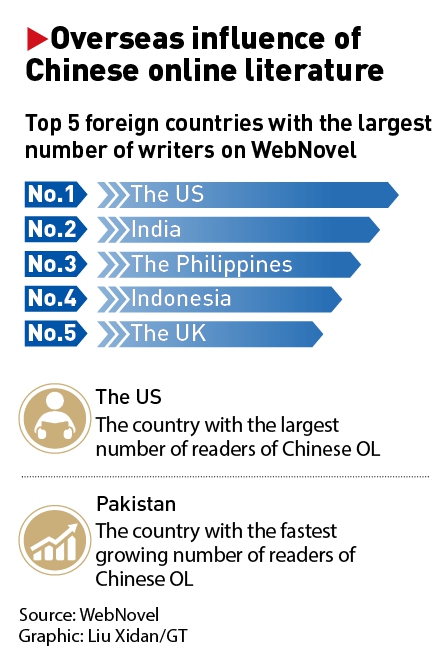ARTS / BOOKS
Exclusive: Richness, variety of Chinese culture helps online literature attract 170 million fans overseas and rising
A click away

Photo: VCG
By the end of 2022, China's online literature (OL) had attracted around 170 million overseas readers, according to a report jointly published Sunday by the Global Times Research Center and China Literature Limited (CLL) - the industry's leading platform. The platform had hosted foreign language versions of 2,900 Chinese web novels by the end of 2022.The report looked into "overseas influence" of China's OL, uncovering promising numbers and major trends among readers worldwide.
Pointing out the popularity of tags such as "Chinese Taoism," Feng Jia, a digital publication expert, told the Global Times that the rapidly growing Chinese OL industry is helping "revive traditional Chinese culture."
Overseas success
Comparing OL and the "offline" publishing industry, Feng told the Global Times that OL has become increasingly popular worldwide due to the way it avoids "logistic defects" such as the time-consuming printing process and narrower promotion channels.
"OL works have a higher 'rate of productivity.' As long as writers' creativity pours forth, the industry will be prolific with works," Feng said.
More than 35.16 million - that's the total number of OL works that Chinese writers produced as of 2022, an increase of 3 million works from that of 2021, Li Yilun, an OL industry insider, told the Global Times, noting that 2023's growth is sure to "easily" surpass this achievement.
Chinese OL writers' thriving creativity has raised the confidence of online platforms exporting works overseas.
CLL alone has authorized more than 800 digital and physical publications of OL works in overseas countries. Of these, 16 notable works on the group's online platform Qidian, such as period novel Ao Xu, have been collected by the British Library in the UK.
Zhang Yiwu, a literature professor at Peking University, told the Global Times that exporting OL content from China is nothing new since China has long established "the world's best OL industry ecology."
Li said that Western readers' love of Chinese OL is a "seal of approval" that reflects their high quality.
Chinese OL's seemingly smooth journey overseas has not simply relied on market share, but has also largely benefited from the "richness and variety of Chinese culture," said Yao Jianbin, a professor from Beijing Normal University.
The report shows that besides "panda," other terms that carry iconic Chinese characteristics like "Taoism," "Chinese tea art" and "martial arts" have become hot search terms among overseas readers.
Another report, Ten Key Words for Online Literature in 2022, jointly published by CLL and The Paper, showed that "Chinese stories" was at the top of the list - further evidence of the power of the Chinese OL trend.
Across genres such as sci-fi, fantasy and historical fictions, OL works such as period fantasy novel Wisdom of Song and sci-fi series Di Qiu Ji Yuan (lit: The Epoch of Earth), conveying Chinese cultural values, have been welcomed overseas.
"The success closely connects with rising overseas interest in China, Chinese culture, the country's fast development and more," Yao said.
Youth power
According to the latest report, CLL's overseas-target platform WebNovel has readers in more than 200 countries and regions around the world. Chinese OL works are mainly popular among young people.
Li told the Global Times that the young reader trend first began taking shape back in 2020. Around that time, half of Chinese OL readers were entering their 20s and belonged to the Generation Z.
Fang Xiaoxue, a 23-year-old reader in Wuhan, Hubei Province, told the Global Times that reading OL was popular at her university.
Besides the convenience of OL works, which can be pulled up on her phone almost anywhere, what she likes the most about these works are "themes that are reflect young people's attitudes and dreams."
The power of Generation Z is not just limited to readers; young Chinese are becoming writers as well. Looking at OL platform WebNovel for example, 37.5 percent of writers were born in the 2000s.
Ma Ji, a literature expert with the China Writers Association, said that China's thriving OL industry has cleared a "broader path" for Generation Z writers in the country to practice and hone their skills.
Most of these young writers are starting their careers online instead of in print.
This change is making OL an important "transitional stage" for the formulation of "new literature" in China.
"The innovative narratives Chinese writers have created to attract overseas readers, especially Generation Z readers, makes for quite a different reading experience than traditional literature," Yao noted.
With his team, Yao has been researching Chinese literature's overseas influence, generating several reports on the matter.
According to the report, sites such as WebNovel have more than 340,000 overseas online writers. While the largest number of foreign readers comes from countries such as the US, writers come from other countries like India and the UK.
The US has the largest number of online writers on the platform, followed by India, the Philippines, Indonesia and the UK.
"No matter the language differences, they all weave stories about people's dreams. Such stories transcend cultural differences. This is the charm of OL," said Yang Chen, vice president and chief editor of CLL.

Source: WebNovel Graphic: Liu Xidan/GT

